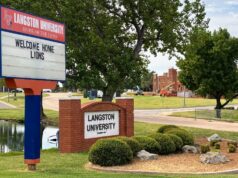From my days as a closeted Dungeons & Dragons geek, I know that a phoenix is a mythical bird that gloriously immolates, only to rise from its own ashes once every thousand years or so.
I didn’t know that one type of real phoenixes also has vampire teeth capable of sucking the finances out of unsuspecting students, many of them veterans.
According to an Oklahoma Watch story from Sept. 29, the University of Phoenix, a nationwide online-based “college” with few physical campuses, has some of the worst graduation rates among any of Oklahoma’s 46 colleges and universities. Oklahoma Watch’s Victor Henderson broke down recently released federal data thusly: “Only 14 percent of students graduate from the (University of Phoenix) Tulsa facility and 16 percent from the Oklahoma City (location).”
Oklahoma City Community College and Rose State College also have graduation rates of 16 percent, but,
“Students at Tulsa and Oklahoma City campuses of the University of Phoenix owe an average of $35,500 in federal student loans, the second highest debt load in the state.”
DeVry University, another higher-education, ghost-campus vampire, leads the pack in student debt, averaging just over $43,000 per student. On average! For some perspective, OU and OSU average about $20,000 in student debt. At the same time, well above half of all students at both Phoenix campuses are considered low-income students, coming from families earning less than $40,000 per year.
Phoenix well-known as a vampire
CollegeResults.org calls the school a “college dropout factory.” According to its listing on that website, U of P “falls in the bottom 5 percent of all four-year colleges nationwide for its extraordinarily low graduation rate.”
To people who keep up with these sorts of things, this information should come as no surprise. U of P has faced criticism for years regarding the perceived practice of preying upon recently returned veterans “with misleading ads while selling expensive and woefully inadequate educations,” according to CollegeResults.org. Since military veterans have access to educational funds from the GI Bill, they make ripe targets for exploitative enrollment tactics.
The problem has become so well known and widespread that, on Oct. 8, the Department of Defense “suspended the college from recruiting on military bases and accessing federal education funding for service members.”
The beginning of the end?
That alone could be seen as the beginnings of Phoenix’s fiery blaze out of existence, and other recent news supports the hypothesis that the bird won’t be flying so high for much longer.
Apollo Education Group, the Phoenix-based parent company of the for-profit university, “expects its student numbers next year to be down 70 percent from its 2010 peak of nearly 477,000 students.” Further, the company’s net revenue has fallen almost 50 percent during the same period. In turn, APOL’s stock price has crashed through the floor.
So, in the end, it’s a good thing that a company even our military finds too aggressive and predatory will likely face some serious financial turmoil in the coming months. Rarely do good business and good ethics intersect, it seems, but University of Phoenix may be facing a final flame-out with no resurrection in sight.
Everyone has a choice
At the end of the day, higher education remains a choice for most Americans, and choices are plentiful. But companies like U of P and DeVry spend millions of dollars on mid-day television advertisements aimed at the unemployed, the infirm and otherwise vulnerable Americans who actually aspire to improving their skillsets and employment opportunities.
Depending on the desired degree, choosing college may not actually be the wisest decision for everyone. There’s a lot to be said for attending a specialized trade school — like Oklahoma’s publicly funded CareerTech system — and learning something actually useful, like plumbing or auto repair. While I don’t mean to disparage the college hopefuls out there or diminish the value of the college experience (which, in my opinion, REQUIRES a physical campus), I do think that, in this day and age, the decision to go to college should be made through a self-critical lens of personal desires and realistic expectations.
While we often get what we pay for, we sometimes get far less. Unfortunately, by that time, there’s little to nothing anyone can do about it.






















